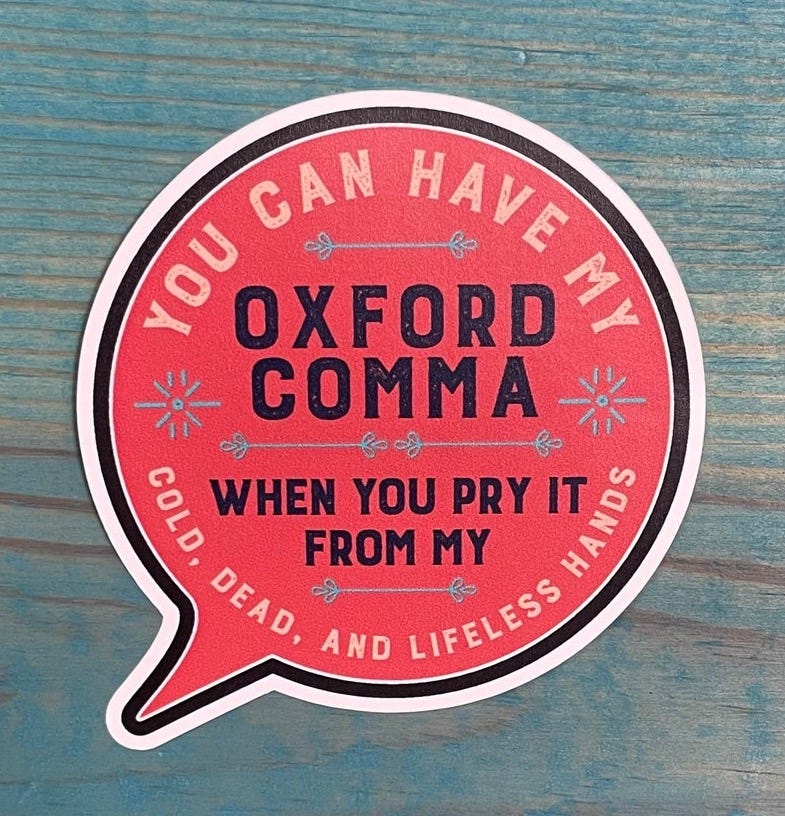A Gritty Little Tourist Town (GLTT, as it is affectionately known) is working its way through its publication schedule. Next up—my least favorite phase: proofreading.
How hard could it be to deal with proofreading? Just let the proofreader tell you where you misspelled a word or misplaced a comma, and fix it.
Ah, but you don’t understand the mental life of an author. Take away our anxieties and neuroses and we have no personality at all.
Okay, I have made peace with the fact that commas have moved on from what Sister Rose Marie taught me sixty years ago. The “A” I got in English back is totally irrelevant today. Those commas have been dropping out of the written page every decade since then.
It’s not just the debate about the Oxford comma. (If you don’t know what that is, you can google it and spend the rest of the day down a rabbit hole and fierce debate about AP Style and Chicago Manual of Style.)
It’s also about all those commas that used to separate thoughts within a sentence.
The upshot is that I pretty much yield the comma issue to the proofreader. “Whatever she says.”
But when I go through the manuscript after she has marked it up, and see correction after correction in a work that I thought I had fine-tooth-combed—I feel like I am back in grade school, looking at a paper that the teacher’s red pencil has bled over. (And what about that last sentence? Does that comma after “marked it up” belong, or would she red pencil it? No idea.
I’m trying, I’m really trying to get over the pain of dealing with some upstart minor functionary telling me, the author, who graduated from the prestigious liberal arts college and the Ivy League university, both with honors, and now is an author, that I am wrong.
Well, I tried to yield the comma issue to her. The farther I move through the pages, the more irritated I get.
So people at the coffee shop where I am working are startled to hear me explode, “That’s not right!!”
Grammar is where the proofreading wars entire a whole new level of engagement.
I don’t usually scream about commas. I have made that much progress. It’s when she corrects my grammar. The proof reader for Prozac Monologues took this sentence fragment:
“…every person at that meeting, and me, too, if I had been thinking clearly at the time…”
and wanted me to say I, too.
Okay, she’s right. “I, too” would be grammatically correct, because “I” am one of the subjects of that sentence. See, Sister Rose Marie did teach me some things that endure.
But no, she’s WRONG!! I would never say “I, too” in that position in a sentence. I write for how it sounds. And I think that “I, too” sounds pedantic and silly. What do you think?
I tried. I really tried in my second book to address this issue. It’s called A Gritty Little Tourist Town: Bar Tales from Costa Rica. I warned the proofreader on the style sheet and the reader on the copyright page that people in bars do not always speak in grammatically correct language. Especially bars in a gritty little tourist town in Central America. And I did not correct their grammar in the text. Nevertheless, the proofreader felt she had to.
So I screamed. So sue me
Ah, but the author has the ultimate weapon. It is a magic word that makes the author’s woes disappear.
That word is STET.
It comes from the Latin stare, which means to stand. Stet means “let it stand.” Or in the language used in a bar in a gritty little tourist town in Central America: “Leave it the f*** alone!”
Sorry about that. I did do some editing, and while the f-bomb makes a frequent appearance in such bars, it occurs in just two of my stories.
Anyway, the proofreader fixed my commas; she wrangled the text into near conformity with the Chicago Manual of Style; and though she missed the joke in one story, she did provide clarity in a few others.
And I do value clarity. Unless it interferes with the joke.
So thanks be to the proofreader and thanks be that we have moved on to the next stage.
I think I owe you a cover reveal. Covers - that too was a process. But I’ll save it for next month.
And what puts you over the edge at your job?






I...um...me, too, am of the "how it sounds" tribe. I reason it's all about the voice. But sometimes that argument doesn't work for the proofreader! Enjoyed reading this one, Willa.
I feel so seen! The comma conundrum is so very real. 🤪